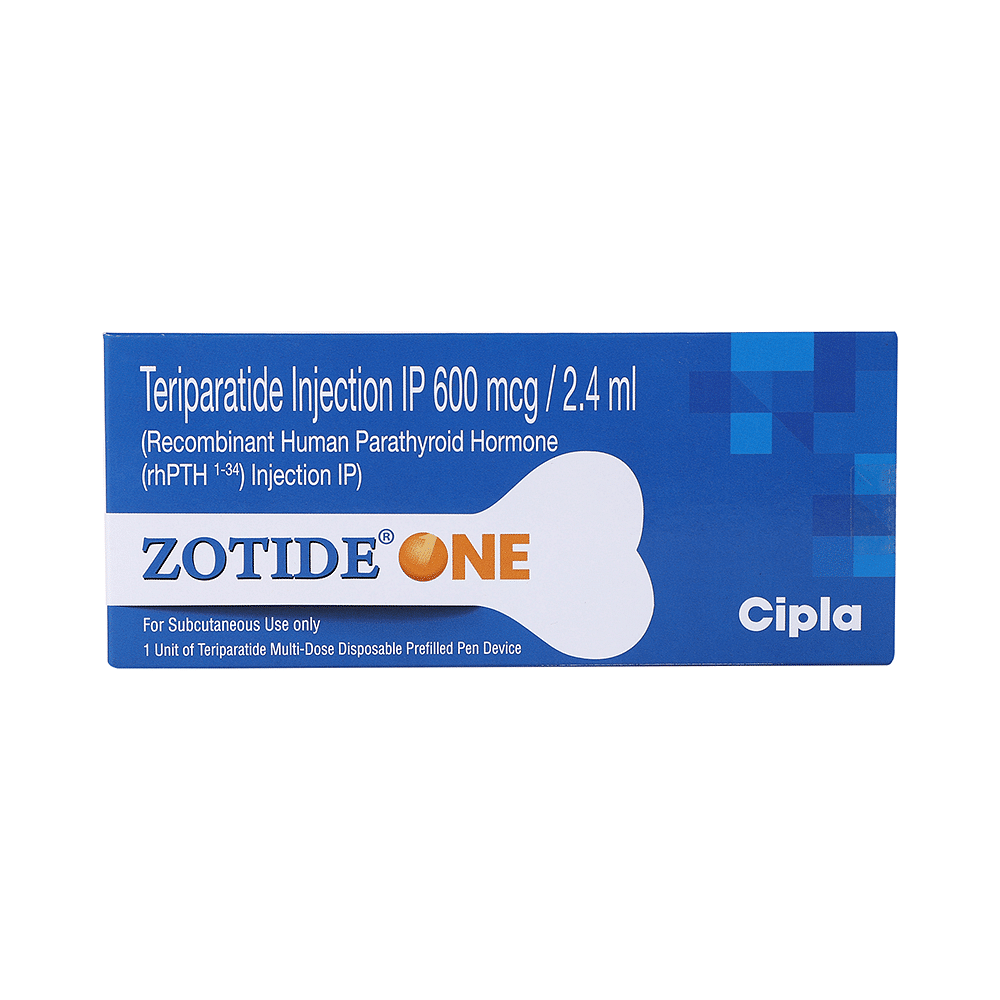
Gemtide Injection (2.4ml Each)
Manufacturer
Alkem Laboratories Ltd
Salt Composition
Teriparatide (600mcg)
Key Information
Short Description
Gemtide Injection (2.4ml Each) is a man-made version of parathyroid hormone used to treat men and postmenopausal women who have severe osteoporosis with a high risk of fractures.
Dosage Form
Injection
Introduction
Gemtide Injection (2.4ml Each) is a synthetic form of a natural human hormone called parathyroid hormone (PTH). It works by increasing the number and activity of bone-forming cells (osteoblasts). This strengthens the bones and minimizes the risk of fractures.
Directions for Use
Your doctor or nurse will give you this medicine. Kindly do not self-administer.
How it works
Gemtide Injection (2.4ml Each) is a synthetic form of a natural human hormone called parathyroid hormone (PTH). It works by increasing the number and activity of bone-forming cells (osteoblasts). This strengthens the bones and minimizes the risk of fractures.
Quick Tips
Gemtide Injection (2.4ml Each) should be injected every day under the skin (subcutaneous injection) of the thigh or abdomen. Do not take it for more than 2 years. You may have low blood pressure and dizziness during the initial few days. If you feel dizzy (light-headed) after injection, sit or lie down until you feel better. Tell your doctor immediately if you experience nausea, vomiting, constipation, low energy, or muscle weakness. These may be signs of high calcium levels in your blood. Tell your doctor if you are breastfeeding, pregnant, or plan to become pregnant.
Related Medicines

Bonista 600mcg Injection

Zotide One Injection

Gemtide Injection

Osteri 600mcg Injection

Zotide 600mcg Injection

Teritide 600mcg Injection
Frequently asked questions
Is Gemtide Injection (2.4ml Each) a steroid?
Gemtide Injection (2.4ml Each) is not a steroid. It is used to treat osteoporosis caused by long-term use of steroids.
Can I take this medication for long term in terms of Osteoporosis?
Gemtide Injection (2.4ml Each) should not be taken for more than 2 years. It is important to inform the doctor if you have previously used this medication, as you should only receive one treatment course of 24 months or less in your lifetime.
How is Gemtide Injection (2.4ml Each) stored at home?
Always store Gemtide Injection (2.4ml Each) in a refrigerator at a temperature between 2°C and 8°C. Avoid placing the medication near the ice compartment, as freezing may damage it and decrease its effectiveness. The medication can be used for up to 28 days after the first injection if not used within this period.
Who should not use Gemtide Injection (2.4ml Each)?
The doctor will determine if the medication is needed based on the patient's specific condition. It should be avoided in patients with kidney impairment, Paget’s disease, bone cancers, or unexplained high serum calcium levels. Additionally, it should not be used by children, young adults, pregnant women, or lactating mothers. Before starting treatment, it's important to inform your doctor about any medical conditions and medications you are currently taking.


